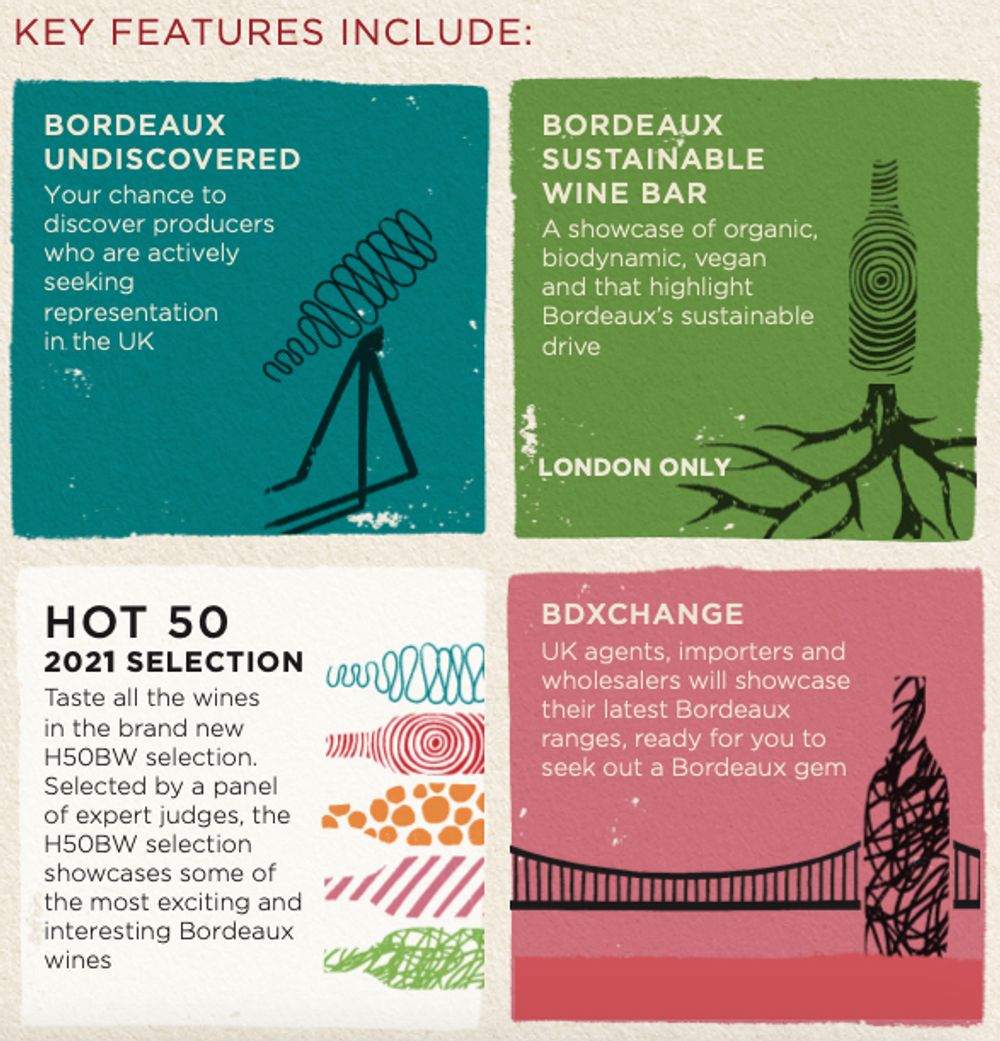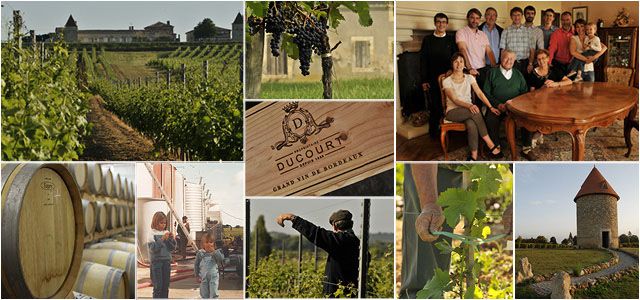The Bordeaux Day events are taking place with two tastings per day between 11am-2pm and 3pm-6pm. They include
- Bordeaux Day London September 8: Camden House, Camden Lock Place, London, NW1 8AB. Register here.
- Bordeaux Day Manchester September 9: Oglesby Atrium, Stoller Hall, Hunts Bank, Manchester, M3 1DA. Register here.

The Bordeaux Day tastings will give specialist wine buyers the chance to: go through Bordeaux’s Hot 50 2021 Selection of wines chosen by an expert panel of judges; meet and talk to UK importers and taste their selected ranges of Bordeaux wines; look at what Bordeaux is doing to promote sustainability and taste a selection of organic, biodynamic and vegan wines; seek out wineries that are looking for UK representation with wines priced between £6 and £25.
Here Bordeaux producer Jonathan Ducourt explains why he is taking part.
Can you tell us about Bordeaux Day, why you’re excited to present your wines at this event and what you’re looking to get out of it?
Bordeaux Day is a great opportunity to display the variety of wines produced in our region. Too often Bordeaux is associated with expensive red wines but there are so much more to discover. This event also give us a chance to show to retailers and distributors wines currently available in the market and create new business opportunities
Which of your wines will be presented at Bordeaux Day?
We will show our Chateau La Rose du Pin Entre Deux Mers white 2020 that is part of this year 50 Bordeaux selection for UK. Our importer Charles Taylor Wines will also show two other wines from our winery : 2015 Château des Demoiselles, Castillon Côtes de Bordeaux & 2016 Château Jacques Noir, Saint Emilion.
Can you tell us about your background and how you became a winemaker?
Before working at the family estate, I have acquired experiences in the wine industry such as vineyard management, winemaking and sales : Napa Valley, Tuscany, New Zealand and, of course, Bordeaux . I came back to develop sales and marketing at our family winery, promoting our châteaux and brands around the world.
Can you tell us about Famille Ducourt and what you see as being its main point of difference in your appellation?

The Ducourts make wines from across six appellations of Bordeaux
We are one of the largest independent family wine producers in Bordeaux. We own 480ha of vineyards, spread over six appellations, mainly in Entre Deux Mers region and on the Right Bank. All their vineyards are sustainably farmed & we have also started official organic conversion on 33ha in 2020. We elaborate a wide variety of wines (white, rosé, and reds) and distribute in about 40 countries.
One of our main points of difference is innovation. Why? Because we love to come up with new ideas and not get stuck in a routine. We want to test new methods that allow us to improve and advance our knowledge. Because we are also constantly listening to our clients and what they want, and new consumer trends around the world.
What sort of wines are you making and why?
We produce 55% red wine, 35% white wine and 10% rosé wine. A big proportion of fresh wines is quite unusual in Bordeaux but it has proven to be very successful strategy for us. Whether it’s red, white or rosé, most professionals and consumers agree that our wines are characterised by finesse, elegance, precision and flavour.
Have you changed the way you have been making those wines to make them more appealing and market focused? If so, what are those changes and why did you make them?

We did not make big changes to our wines but our range have been diversified with more style of wines. Our most recent additions include pale rosé, off dry whites and fruity reds.
What are the hardest things to get right when looking to make more modern styles of fruit forward wines?
We have always made both modern styles, fruit forward wines but in a traditional style. We believe there is a space for each of those wines in the market.
Can you tell us about the HVE certification, what are the challenges working to this certification?
Our family has started international certification in 1996 with ISO 9001. And then continued with ISO 14001 and HVE certification. We are also aiming to be certified Corporate Social Responsibility (CSR) by 2022.
HVE certification has been obtained collectively as a company that is a member of the ‘first Bordeaux Wine Association for Environment (SME). This evolutionary management system aims to minimise the impact of our activity on the environment and progressively improve our performance in the following areas: wastes, emissions, energy consumption, use of raw materials and natural resources, preservation of local fauna and flora.
What benefits do you think it makes to how the wine tastes and performs?

The Dacourts have a strong commitment to organic winemaking and working with different varietals to make the most of their soils and environment
I am not sure the wine taste better but our environment is definitely better.
There are so many things we do beyond just the certification. Here are few examples:
- green cover during winter
- planting and maintaining 100kms of edges, maintaining 50ha forest, 12 lakes, 30ha of grassland for ecosystem biodiversity
- experimenting with new grapes varietals
- more tanks of smaller size for better plot selection
- reducing to minimum the intervention in winemaking.
- using better equipment like our press, cross flow filter, bottling line, ageing cellar, etc.
How do you see Bordeaux overall and the big changes taking place in how wines are being made?
Bordeaux is a big region. Some of our customers like when we are innovative, other prefer when we stay traditional. We have always been dancing on these two feet. The biggest change I see is how there are less and less small family producers, more concentration, more contact with the consumers and so wines made more appealing toward the customers
Are you looking to age your wine differently and use different non oak options – if so what?
Yes. A big part of our reds don’t see any oak. They are aged in stainless steel or concrete tanks.

It’s a close family affair at the Docourts
What else do you think Bordeaux as a whole could do better to improve the style of wines it makes?
I have the opportunity to taste wines from all over the world. We don’t need to improve the style of Bordeaux, especially in our price range below £15. We offer superb value, for example, on our whites compare to others. It is just that we are not visible on the shelves and consumer don’t think about us.
When the distributors decide to carry our wines they find their spot and are successful
Do you think Bordeaux has a perception issue in terms of the wines you are making and the trade and consumer understanding of what is available?
Of course. Ninety nine per cent of the press talks about the expensive Bordeaux, the ratings, and the Primeurs. It is so rare for affordable Bordeaux wines to make the headlines. So the trade and consumer don’t consider we are actually very good in this category too.
You are working with new varietals like in your Metissage wine. What grapes are you experimenting with and why did you want to start working with them?
We are experimenting with four new varietals: Cabernet Jura a red variety; and three whites varieties – Sauvignac, Souvigner Gris and Muscaris.
During a visit to a friend’s home in 2013, a winemaker in Languedoc-Roussillon, my brother, Jérémy, discovered naturally disease-resistant grape varieties. Enthused by the idea of elaborating wines that would be more respectful to the environment, he convinced us to plant the very first vineyards of this kind in Bordeaux.

Multi generational winemaking has helped the Ducourts innovate and keep changing
What sort of results have you seen so far?
In the vineyard, 80% to 90 % less spraying during the growing season. Only organic product are being used (these vineyards are in organic conversion).
For the wine quality – which is always the argument of people opposing to these new varietals – the Métissage red won Silver Medal at Decanter on the 2018 and 2019 vintage. The Métissage white won prestigious international competition in recent vintages.
We start to have distributor following these wines in different countries
What difference sand options do these new styles give you?
These are new varietals with their own style. So when we bottle pure, you get a totally new style. If we make a blend with Bordeaux grape varietal (as Vin de France), you get a new style but with a Bordeax touch. It opens up so many new possibilities.
Currently we are selling three wines with these new varietals : Métissage red (100% Cabernet Jura), Métissage White (100% Sauvignac), Le Chant des Sirènes Gris de Sauvignon (blend of Sauvignon Gris & Souvignier Gris)
We are hoping more people will take these varietals seriously as they really deserve it.
Are you planting INAO varieties? If so which ones, why are you working with them and what results do you expect?
For the moment, we do not plan to add more varieties in our vineyards. In fact, we have already expanded the diversity of grapes in our vineyards over the last 10 years. In total we have 14 grape varieties planted including:
- eight white grape varieties: Sauvignon Blanc, Sauvignon Gris, Sauvignac, Souvignier Gris, Muscaris, Muscadelle, Semillon, Colombard.
- six red grape varieties: Cabernet Jura, Merlot, Cabernet Sauvignon, Petit Verdot, Cabernet Franc, Malbec.
It is already challenging to follow up all these varieties and find the good itinerary in the vineyard, winery and the distribution to make the best out of these 14 grapes. But maybe in five years, we will experiment with these INAO varieties too. Probably a red variety to complement with Cabernet Jura.
- You can find out more about the Ducourt wines here.
- You can find our more about Bordeaux Day London on September 8 at Camden House, Camden Lock Place, London, NW1 8AB by clicking here.
- You can find our more about Bordeaux Day Manchester on September 9 a Oglesby Atrium, Stoller Hall, Hunts Bank, Manchester, M3 1DA by clicking here.

































